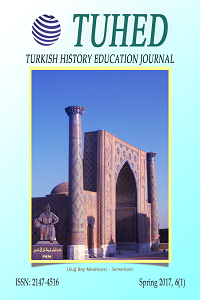Abstract
European Union (EU) achieved major progress in terms
of economic, political and social integration since Treaty of Rome. Changing
global order and EU expansion process forced the Union to generate policies in
various areas. Main policy areas include education and culture, as well. EU
aims to strengthen intercultural dialogue to advance basic values such as human
rights, democracy and rule of law. In this context, teaching and learning
intercultural knowledge may be accepted as essential for democratic culture and
social cohesion. History teaching in schools is regarded as a tool in order to
create European consciousness. Starting from this point, this study aims to
discuss EU sponsorship for history teaching in schools to promote social
cohesion and active citizenship, as this matter is considered critically
important for EU reached a historical milestone to unite Europe. However, EU
policies on this subject are not supportive and complementary for member state
policies. As a result, a reformative initiative by the EU is evaluated as an
utopist act.
References
- Aktekin, S., Harnett, P., Öztürk, M., ve Smart, D. (2009). Çok kültürlü bir Avrupa için tarih ve sosyal bilgiler eğitimi. Ankara: Harf Eğitim.
- Delanty, G. (2005). Avrupa’nın icadı: fikir kimlik gerçeklik. Çev. Hüsamettin İnanç. Ankara: Adres.
- Fox, E. (20 Aralık 2012) . EU leaders collect nobel peace prize to put in £ 82 m museum of european history. British Express.
- Gruber, B. (7 Kasım 2006). Joint German-French history book a history-maker itself. DW. .
- Habermas J. (2008). Küreselleşme ve milli devletlerin akibeti. Çev. Medeni Beyaztaş. İstanbul: Bakış.
- Habermas, J. ve Derrida J. (2003). Avrupa’nın yeniden doğuşu. Kozmopolit.
- Kaiser, W. Krankenhagen, S. and Kerstin P. (2016) Exhibiting Europe in museums: transnational networks, collections, narratives and representations. Berghahn Books.
- Kroeger, A. (2007). Germany seeks joint history book. UK: BBC News.
- Martín-Arroyo P. (2013). ‘Histoeuropeanisation’: Challenges and implications of (re)writing the history of europe ‘europeanly’, 1989-2015. (MA Thesis). College of Europe.
Abstract
Avrupa Birliği (AB), Roma Antlaşması’ndan bu yana ekonomik, siyasi ve
sosyal bütünleşme yolunda büyük ilerlemeler kaydetmiştir. Değişen küresel düzen
ve AB’nin genişleme süreci Birliği çeşitli alanlarda politikalar üretmeye
zorlamıştır. AB’nin temel politika alanlarından biri de eğitim ve kültür
üzerinedir. AB, temel değerleri olan insan hakları, demokrasi ve hukukun
üstünlüğüne saygıyı ilerletmek üzere kültürlerarası diyalogu güçlendirmeyi
hedeflemektedir. Bu bağlamda kültürlerarası bilgi birikiminin öğrenilmesi ve
öğretilmesi demokratik kültür ve sosyal uyum için elzem kabul edilmektedir. Bu
çerçevede okullarda tarih öğretiminin bir Avrupalılık bilinci yaratılması
gayesiyle araç olarak kullanımı öngörülmektedir. Bu öngörüden hareketle bu çalışmada sosyal
uyum ve aktif vatandaşlığın teşviki için AB’nin okullarda tarih öğretimine
sponsor olup olamayacağı hususunun tartışılması amaçlanmıştır. Zira Avrupa’yı
birleştirme hedefi çerçevesinde tarihi bir dönüm noktasına gelen AB için bu
husus ciddi önem taşımaktadır. Ancak AB’nin bu konudaki politikaları üye
devletlerin politikalarını destekleyici ve tamamlayıcı nitelik arz
etmemektedir. Bu nedenle AB’nin bu doğrultuda reformative bir anlaşma için
harekete geçmesi ütopik olarak değerlendirilmektedir.
References
- Aktekin, S., Harnett, P., Öztürk, M., ve Smart, D. (2009). Çok kültürlü bir Avrupa için tarih ve sosyal bilgiler eğitimi. Ankara: Harf Eğitim.
- Delanty, G. (2005). Avrupa’nın icadı: fikir kimlik gerçeklik. Çev. Hüsamettin İnanç. Ankara: Adres.
- Fox, E. (20 Aralık 2012) . EU leaders collect nobel peace prize to put in £ 82 m museum of european history. British Express.
- Gruber, B. (7 Kasım 2006). Joint German-French history book a history-maker itself. DW. .
- Habermas J. (2008). Küreselleşme ve milli devletlerin akibeti. Çev. Medeni Beyaztaş. İstanbul: Bakış.
- Habermas, J. ve Derrida J. (2003). Avrupa’nın yeniden doğuşu. Kozmopolit.
- Kaiser, W. Krankenhagen, S. and Kerstin P. (2016) Exhibiting Europe in museums: transnational networks, collections, narratives and representations. Berghahn Books.
- Kroeger, A. (2007). Germany seeks joint history book. UK: BBC News.
- Martín-Arroyo P. (2013). ‘Histoeuropeanisation’: Challenges and implications of (re)writing the history of europe ‘europeanly’, 1989-2015. (MA Thesis). College of Europe.
Details
| Journal Section | Research & Theoretical Articles |
|---|---|
| Authors | |
| Publication Date | May 21, 2017 |
| Submission Date | October 31, 2016 |
| Acceptance Date | March 2, 2017 |
| Published in Issue | Year 2017 Volume: 6 Issue: 1 |
Cited By
21. Yüzyıl Becerileri Perspektifinden Tarih Eğitiminin Yönü
İnsan ve İnsan Dergisi
Sibel YALI
https://doi.org/10.29224/insanveinsan.818785
TARİH ÖĞRETİMİNE YENİ BİR YAKLAŞIM: BÜYÜK TARİH PROJESİ
Turkish History Education Journal
https://doi.org/10.17497/tuhed.628738
ANNOUNCEMENTS:
1- APA7 Referencing Style:
As of May 2024, TUHED will follow APA 7 (American Psychological Association) style for referencing and citation. For more information, please refer to the TUHED template and writting guidelines.
2- Early Release:
According to the TUHED's new publication policy, the articles which have completed the evaluation process will be published online-first. It will no longer be necessary for manuscripts to wait until the “next issue”. Early Release articles will receive an international identification code (DOI), and identified page numbers.
3- Ethics Committee Approval:
In accordance with the ULAKBİM decision of 25 February 2020, Ethics Committee Approval must be obtained for studies on people (without age restrictions), this approval must be specified in the Method section of the article and signed Ethics Committee Approval must be uploaded to the system. Applications that do not meet these requirements will not be considered for publication.
4- New Publication Policy
Beginning from Spring 2021 issue TUHED will require all Turkish manuscripts to contain a full-text English translation. Manuscripts submitted in Turkish will be requested to have full-text English translation if they are accepted for publication after the review process.
Turkish History Education Journal site and its metadata are licensed under a Creative Commons Attribution-NonCommercial 4.0 International License
Permissions beyond the scope of this license is available at COPYRIGHT

